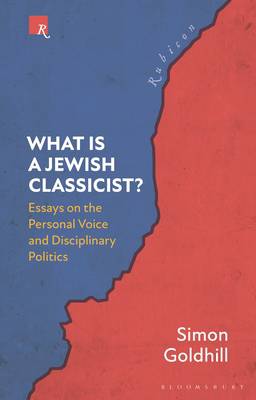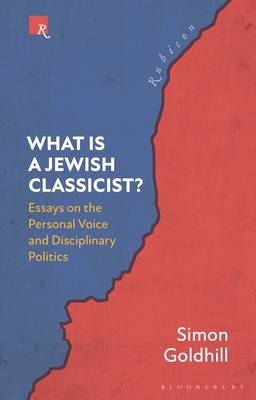
- Retrait gratuit dans votre magasin Club
- 7.000.000 titres dans notre catalogue
- Payer en toute sécurité
- Toujours un magasin près de chez vous
- Retrait gratuit dans votre magasin Club
- 7.000.0000 titres dans notre catalogue
- Payer en toute sécurité
- Toujours un magasin près de chez vous
127,45 €
+ 254 points
Format
Description
In recent years, there has been no issue that has convulsed academia and its role in society more stridently than the personal politics of its institutions: who has access to education? How does who you are change what you study and how you engage with it? How does scholarship reflect the politics of society - how shouldit? These new essays from one of the best-known scholars of ancient Greece offer a refreshing and provocative contribution to these discussions.
What is a Jewish Classicist? analyses how the personal voice of a scholar plays a role in scholarship, how religion and cultural identity are acted out within an academic discipline, and how translation, the heart of any engagement with the literature of antiquity, is a transformational practice. Topical, engaging, revelatory, this book opens a sharp and personal perspective on how and why the study of antiquity has become such a battlefield in contemporary culture.
The first essay looks at how academics can and should talk about themselves, and how such positionality affects a scholar's work - can anyone can tell his or her own story with enough self-consciousness, sophistication and care? The second essay, which gives the book its title, takes a more socio-anthropological approach to the discipline, and asks how its patterns of inclusion and exclusion, its strategies of identification and recognition, have contributed to the shape of the discipline of classics. This initial enquiry opens into a fascinating history of change - how Jews were excluded from the discipline for many years but gradually after the Second World war became more easily assimilated into it. This in turn raises difficult questions for the current focus on race and colour as the defining aspects of personal identification, and about how academia reflects or contributes to the broader politics of society. The third essay takes a different historical approach and looks at the infrastructure or technology of the discipline through one of its integral and time-honoured practices, namely, translation. It discusses how translation, far from being a mere technique, is a transformational activity that helps make each classicist what they are. Indeed, each generation needs its own translations as each era redefines its relation to antiquity.
What is a Jewish Classicist? analyses how the personal voice of a scholar plays a role in scholarship, how religion and cultural identity are acted out within an academic discipline, and how translation, the heart of any engagement with the literature of antiquity, is a transformational practice. Topical, engaging, revelatory, this book opens a sharp and personal perspective on how and why the study of antiquity has become such a battlefield in contemporary culture.
The first essay looks at how academics can and should talk about themselves, and how such positionality affects a scholar's work - can anyone can tell his or her own story with enough self-consciousness, sophistication and care? The second essay, which gives the book its title, takes a more socio-anthropological approach to the discipline, and asks how its patterns of inclusion and exclusion, its strategies of identification and recognition, have contributed to the shape of the discipline of classics. This initial enquiry opens into a fascinating history of change - how Jews were excluded from the discipline for many years but gradually after the Second World war became more easily assimilated into it. This in turn raises difficult questions for the current focus on race and colour as the defining aspects of personal identification, and about how academia reflects or contributes to the broader politics of society. The third essay takes a different historical approach and looks at the infrastructure or technology of the discipline through one of its integral and time-honoured practices, namely, translation. It discusses how translation, far from being a mere technique, is a transformational activity that helps make each classicist what they are. Indeed, each generation needs its own translations as each era redefines its relation to antiquity.
Spécifications
Parties prenantes
- Auteur(s) :
- Editeur:
Contenu
- Nombre de pages :
- 200
- Langue:
- Anglais
- Collection :
Caractéristiques
- EAN:
- 9781350322578
- Date de parution :
- 14-07-22
- Format:
- Livre relié
- Format numérique:
- Genaaid
- Dimensions :
- 140 mm x 216 mm
- Poids :
- 376 g

Les avis
Nous publions uniquement les avis qui respectent les conditions requises. Consultez nos conditions pour les avis.






